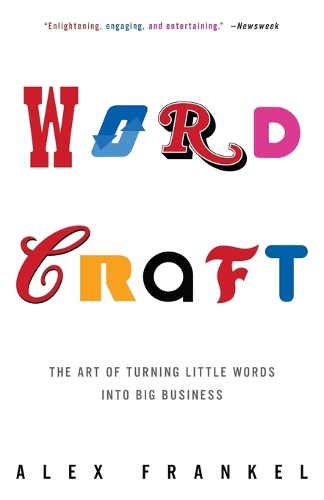
Wordcraft: The Art of Turning Little Words into Big Business
(Paperback)
Publishing Details
Wordcraft: The Art of Turning Little Words into Big Business
By (Author) Alex Frankel
Random House USA Inc
Crown Publications
15th April 2005
United States
Classifications
General
Fiction
658.827
Physical Properties
Paperback
256
Width 135mm, Height 203mm, Spine 15mm
201g
Description
In Wordcraft, Alex Frankel, a business writer who once briefly worked as a namer, tells the story of how ve major brands got their names: BlackBerry, Accenture, Viagra, the Porsche Cayenne, and IBMs e-business. Behind each name is an account of how words and language infuse the products we use every day with meaning, and how great words actually succeed in changing peoples behavior. The book is lled with stories about words that come from every corner of our world: technology, health, sports, food, business, and more.
Reviews
Enlightening, engaging, and entertaining. Newsweek
A thoughtful and engaging exploration of how companies and products get their names nowadays, as well as the function of brands in a global culture . . . Hilarious and revealing. Wall Street Journal
Words always matter, but they really matter to a corporation trying to make its brand the one we remember out of the thousands we see daily. Thats why the stories behind the creation of names like Viagra or Accenture are so surprisingly rich. With the outsider perspective of a journalist, plus insider perspective gained by crossing over into the synthetic language business himself, Alex Frankel knows the name game like nobody else. Rob Walker, Consumed columnist, The New York Times Magazine
Informative, overdue . . . fascinating. San Francisco Chronicle
Wordcraft is a rare peek inside organizations making enormous decisions about their identities and futuresstruggling to develop a brand name that captures what they want to be when they grow up. Journalist Frankel talks his way into situations most of us never see. The book is both vivid and lively. Chip Heath, professor of organizational behavior, Stanford Graduate School of Business
Author Bio
Alex Frankel has written the On Language column for The New York Times Magazine and reported on business culture for Wired, Fast Company, and Outside. His interest in synthetic language led him to launch his own naming rm and spend twelve months hunting down the origins of leading brand names. He lives in San Francisco.
